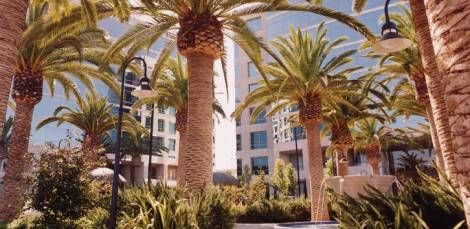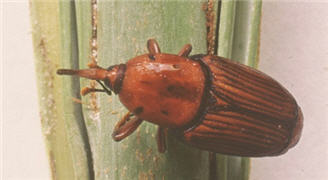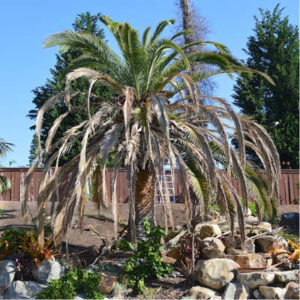
Types of Palm Tree Pests in San Diego
There is no shortage of palm trees in San Diego. Sadly, there’s also no shortage of palm tree pests. In recent years, invasive, non-native insects have taken on a toll on these icons of the West Coast, making it challenging to keep your palm trees looking their best. Which types of palm tree pests do our San Diego arborists find causing the most damage to area landscapes?
Red Palm Weevil

The Arborwell team frequently encounters red palm weevils when compiling arborist reports. One of the biggest threats to area palms, these giant 1.5-inch red-brown insects feed on over 40 different palm species. They have caused millions in economic losses globally.
A delicacy elsewhere in the world, these pests are believed to have been introduced when they were brought into the U.S. for food. However, red palm weevils can fly about a half a mile per day, and they quickly spread through the region by flight and through palm tree sales. Difficult to detect, no one identified the escapees until landscapers noticed area palms slowly dying, the trees looking brown and droopy.
Red palm weevils are tunneling insects with a long, slender snout, which the female uses to penetrate the bark of palms to deposit her eggs. Once hatched, the larvae burrow deep into the tree, consuming it from the inside out, and leaving behind a foul-smelling mush-like substance. Because damage begins high in the tree, where new frond growth emerges, the sound of the gnawing insects often goes unnoticed until tree wellness suffers.
Our arborists are familiar with the signs of red palm weevil infestation, which we often encounter during routine trimming. Our trained professionals know to watch for signs of red palm weevils, including larval tunnels and feces within leaf bases in the tree canopy. We can help you quickly quarantine and rid your grounds of these invasive pests using traps and trunk injection treatments.
Polyphagous Shot Hole Borer

Unlike the massive red palm weevil, polyphagous shot hole borers are small; only the size of a sesame seed! Though tiny, these beetles have decimated hundreds of thousands of trees in Southern California, including healthy palm trees. Polyphagous beetles were discovered in the late winter of 2012, infecting several backyard avocado trees in Los Angeles, and have since spread to surrounding areas.
The pests were possibly introduced via shipments from Southeast Asia, though their specific origin remains unknown. The pest cannot fly but can hitchhikes in landscaping equipment, tree waste, and firewood. Another outbreak occurred a year later, found to be a second species of polyphagous beetle, the result of a second introduction rather than a spread of the L.A. infestation.
Polyphagous shot hole borers attack dozens of landscape tree species, tunneling within. They carry Fusarium, a fungus causing fusarium dieback, which affects hundreds of species. Unlike red palm weevils, these wood-boring beetles do not eat tree bark. They lay eggs in certain species that serve as reproductive hosts, such as California, Fountain, Jelly, and King palms, among many others. Like tiny farmers, they also use the tunnels they excavate to grow Fusarium, their primary food source, cultivating it within infested trees.
Our arborists can quickly recognize the signs of polyphagous beetle infestation and Fusarium dieback, dubbed the shot hole borer-fusarium dieback (SHB-FD) complex. Property owners typically notice limb dieback from the fungus, which blocks the transport of water and nutrients to leaves. When we see tiny little pinholes in tree bark, with sawdust-like powder around the holes, we scrape back bark to look for the tiny beetle in its circular galleries. As ongoing trials using natural predators progress, we use tree injection treatments to exterminate the polyphagous shot hole borer, devising a customized tree care plan to protect your landscape.
Are pests taking a bite out of your landscape? Arborwell Professional Tree Management can help you control many types of palm tree pests in San Diego. Contact us at to speak to one of our ISA certified arborists, or to schedule an examination of potentially infested trees today.
palm tree pests, palm trees, palm weevil, tree health, weevil